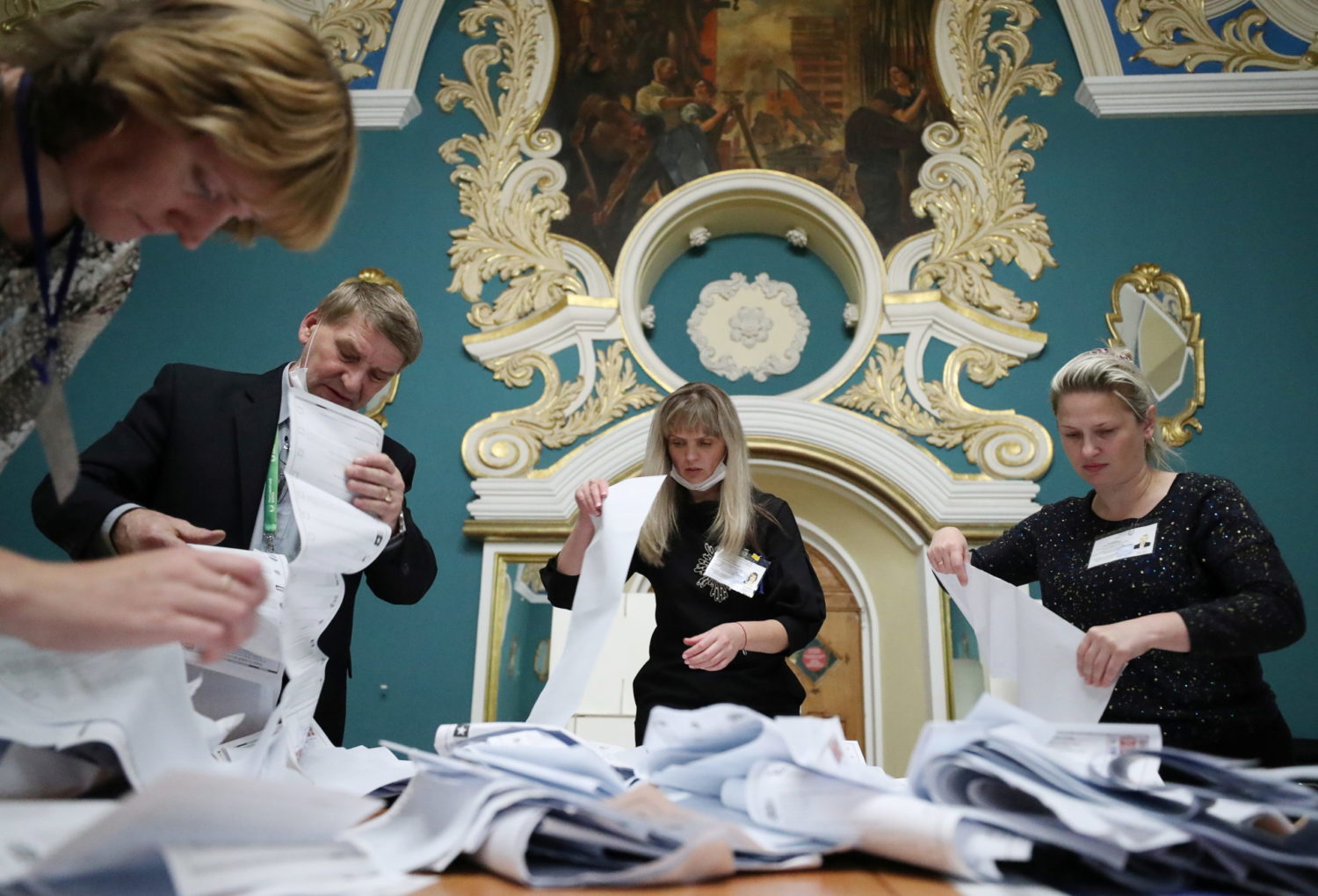
By Andrew Osborn and Maria Tsvetkova
MOSCOW (Reuters) -Opponents accused Russian authorities of mass fraud on Monday after the ruling United Russia party, which supports President Vladimir Putin, won a bigger than expected parliamentary majority despite unease over living standards.
With over 99% of ballots counted, the Central Election Commission said United Russia had won nearly 50% of the vote, with its nearest rival, the Communist Party, taking just under 19%.
The scale of the victory means United Russia will have more than two-thirds of deputies in the 450-seat State Duma lower house of parliament. This will enable it to continue to push through laws without having to rely on other parties.
United Russia, a party that Putin helped found, had always been expected to win. Its most vociferous critics, allies of jailed Kremlin critic Alexei Navalny, were prevented from taking part after a court branded them extremists in June.
Pre-vote surveys had suggested that discontent over years of faltering living standards and corruption allegations would dent United Russia’s support. In the event, near final official results showed it securing around only 4% less than the last time a similar election was held in 2016.
Some Moscow-based Communists who felt cheated called for a protest in the Russian capital on Monday evening. The central square they named as the venue was sealed off by police beforehand.
One of the disappointed Communists, Mikhail Lobanov, had been far ahead, based on a regular voting tally, but suddenly learned he had lost out to a United Russia candidate once electronic votes were added in after a long delay.
“I know that such a result is simply not possible,” Lobanov wrote on Twitter, calling for people to gather to discuss “next steps.”
Candidates opposed to United Russia in Moscow had been ahead in more than half of 15 electoral districts, but all lost after electronic voters were added in.
“With such a colossal number of violations, the results of the State Duma elections cannot be recognized as clean, honest or legitimate,” said Lyubov Sobol, a Navalny ally.
Sobol had hoped to run for parliament herself but Navalny’s allies were barred from taking part after the extremism designation. Critical media and non-governmental organizations were also targeted by the authorities in the election run-up.
Navalny’s allies had tried to drain support from United Russia with an online tactical voting campaign which the authorities had tried to block.
Electoral authorities said they had voided any results at voting stations where there had been obvious irregularities and that the overall contest had been fair.
According to Ella Pamfilova, the head of the election commission, the vote was exceptionally clean and transparent. She told Putin she would look into any complaints before declaring final results on Friday.
Putin gave a short statement, thanking voters after the Kremlin had hailed the result, saying United Russia had confirmed its role as the leading party. The Kremlin said the election had been competitive, open and honest.
‘PUTIN! PUTIN! PUTIN!’
The outcome is unlikely to change the political landscape, with Putin, who has been in power as president or prime minister since 1999, still dominating before the next presidential election in 2024.
Putin has yet to say whether he will run.
The 68-year-old leader remains a popular figure with many Russians who credit him with standing up to the West and restoring national pride.
The near complete results showed the Communist Party finishing in second, followed by the nationalist LDPR party and the Fair Russia party with around 7.5% each. All three parties usually back the Kremlin on most key issues.
A new party called “New People”, appeared to have squeezed into parliament with just over 5%.
At a celebratory rally at United Russia’s headquarters broadcast on state television, Moscow Mayor Sergei Sobyanin, an ally of the Russian leader, shouted “Putin! Putin! Putin!” to a flag-waving crowd that echoed his chant.
Golos, an election watchdog accused by authorities of being a foreign agent, recorded thousands of violations, including threats against observers and ballot stuffing, blatant examples of which circulated on social media. Some individuals were shown on camera appearing to deposit bundles of votes in urns.
One Moscow pensioner who gave his name only as Anatoly said he voted United Russia because he was proud of Putin’s efforts to restore what he sees as Russia’s rightful great-power status.
“Countries like the United States and Britain more or less respect us now like they respected the Soviet Union in the 1960s and 70s. … The Anglo-Saxons only understand the language of force,” he said.
With official turnout reported to be around 52%, there were signs of apathy.
“I don’t see the point in voting,” said one Moscow hairdresser who gave her name as Irina. “It’s all been decided for us anyway.”
(Additional reporting by Gabrielle Tétrault-Farber, Polina Nikolskaya, Tom Balmforth, Anton Zverev and Dmitry Antonov; Writing by Andrew Osborn and Tom Balmforth; Editing by Peter Cooney, Gerry Doyle and Timothy Heritage)












